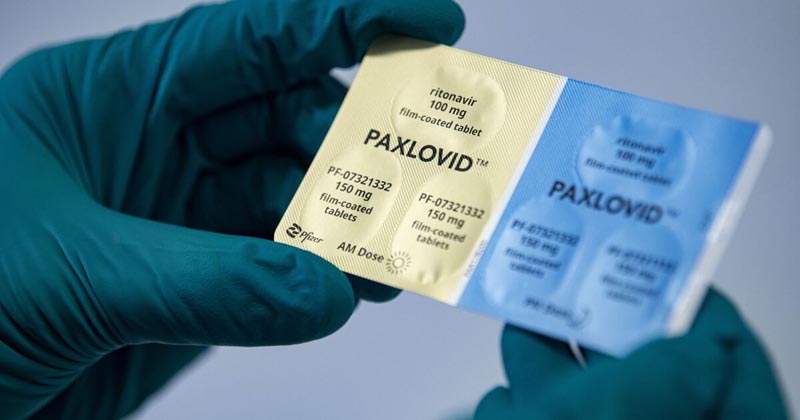
Summary Population-based evaluation of the efficacy of nirmatrelvir-ritonavir in reducing hospital admissions and mortality from COVID-19 Background: A randomized controlled trial involving a high-risk unvaccinated population that was conducted before the Omicron variant emerged found that nirmatrelvir-ritonavir was effective in preventing progression to severe COVID-19. Our objective was to evaluate the effectiveness of nirmatrelvir-ritonavir in preventing severe COVID-19 while Omicron and its subvariants predominate. Methods: We conducted a population-based cohort study in Ontario that included all residents aged 17 years and older who had a positive polymerase chain reaction test for SARS-CoV-2 between April 4 and August 31 2022. compared patients treated with nirmatrelvir-ritonavir with patients who did not receive treatment and measured the primary outcome of hospital admission for COVID-19 or death from all causes between 1 and 30 days, and a secondary outcome of death from all causes . We used weighted logistic regression to calculate weighted odds ratios (OR) with confidence intervals (CI) using inverse probability of treatment weighting (IPTW) to control for confounders. Results: The final cohort included 177,545 patients, 8,876 (5.0%) who received treatment with nirmatrelvir-ritonavir and 168,669 (95.0%) who did not receive treatment. The groups were well balanced with respect to demographic and clinical characteristics after applying stabilized IPTW. We found that the occurrence of hospital admission or death was lower in the group that received nirmatrelvir-ritonavir than in those who did not receive it (2.1% vs. 3.7%; weighted OR 0.56, 95% CI 0.47 -0.67). For death alone, the weighted OR was 0.49 (95% CI: 0.39–0.62). Our findings were similar across strata of age, drug interactions, vaccination status, and comorbidities. The number needed to treat to prevent 1 case of severe COVID-19 was 62 (95% CI: 43–80), which varied across strata. Interpretation: Nirmatrelvir-ritonavir was associated with significantly reduced odds of hospital admission and death from COVID-19, supporting its use to treat patients with mild COVID-19 who are at risk for severe disease. |
Discussion
Antiviral therapies to treat COVID-19 and prevent serious outcomes, such as hospital admission and death, are valuable tools in the global response to the pandemic. The randomized controlled trial (RCT) Evaluation of Protease Inhibition for COVID-19 in High-Risk Patients (EPIC-HR) of nirmatrelvir-ritonavir identified an 89% reduction in progression to severe COVID-19 in participants with high risk of serious illness who were treated, compared to placebo.
However, the trial was conducted between July and December 2021, which was before the emergence of the Omicron variant that is less virulent than the parent virus, and excluded vaccinated people as well as those taking medication. with possible drug interactions. The Evaluation of Protease Inhibition for COVID-19 in Standard-Risk Patients (EPIC-SR) trial recently reported non-significant findings in a press release.
In real-world evaluations of nirmatrelvir-ritonavir while the Omicron variant and its subvariants predominated, a significant protective effect was observed in adults 65 years of age and older in Israel. A retrospective cohort study involving COVID-19 patients attending outpatient clinics in Hong Kong between February 16 and March 31, 2022, identified a reduced risk of hospital admission in adults when administered nirmatrelvir-ritonavir, although attenuated compared to the EPIC-HR trial. Studies that have stratified participants by vaccination status have identified similar reductions in relative risk in vaccinated cohorts, but with smaller reductions in absolute risk due to lower baseline risk of hospital admission or death from COVID-19. Observational studies have risks of bias including residual confounding and immortal time bias.
In Ontario, nirmatrelvir-ritonavir became widely available and funded for all patients in the community in April 2022, with clinical criteria set by the government limiting access only to patients who are older, have comorbidities, or who were unvaccinated. The Ontario COVID-19 Science Advisory Table provided clinical practice guidance to Ontario physicians on the use of COVID-19 therapies with stricter high-risk criteria based on patients who were most likely to benefit from limited supplies of antiviral medications at that time.
A large proportion of patients receiving nirmatrelvir–ritonavir in Ontario would have been excluded from the EPIC-HR trial population (e.g., those previously vaccinated or receiving concomitant medications with significant drug interactions). Observational data evaluating the use of nirmatrelvir-ritonavir may inform future policies and guidelines. Our objective was to evaluate the effectiveness of nirmatrelvir-ritonavir on health outcomes, including hospital admission and death from COVID-19, while Omicron and its subvariants predominate.
Comments
Nirmatrelvir–ritonavir (Paxlovid) significantly reduced the likelihood of hospitalization or death from COVID-19 in people at risk of severe disease, according to new research in CMAJ ( Canadian Medical Association Journal ) https://www.cmaj.ca/lookup/ doi/10.1503/cmaj.221608.
The study, conducted by Ontario researchers, aimed to evaluate the effectiveness of nirmatrelvir-ritonavir in preventing severe disease during the emergence of the Omicron variant. They examined data from adults with mild illness who tested positive for SARS-CoV-2 by polymerase chain reaction (PCR) testing between April 4 and August 31, 2022, and compared 8,876 patients treated with nirmatrelvir. -ritonavir with 168,669 who were not treated. Most patients were over 70 years old, vaccinated, and had potential drug interactions.
A previous randomized controlled trial, Evaluation of Protease Inhibition for COVID-19 in High-Risk Patients (EPIC-HR), conducted before the emergence of the Omicron variant, had found nirmatrelvir-ritonavir to be effective in treating of patients. That trial, however, did not include people who had been vaccinated or who had potential drug interactions.
"Our study, together with previous clinical trials and observational research, supports the effectiveness of nirmatrelvir-ritonavir in reducing COVID-19 hospital admissions and all causes of death," writes lead author Dr. Kevin Schwartz, Public Health Ontario and ICES, Toronto, Ontario, with co-authors.
They found that for every 62 people treated with nirmatrelvir-ritonavir, the drug prevented 1 case of severe COVID-19.
According to Dr. Schwartz, "This study highlights the importance of getting tested for SARS-CoV-2 if you have symptoms and access to Paxlovid for those at risk for severe COVID-19. If you test positive for COVID-19 , age 60, or if you have other risk factors for serious infection, such as chronic medical conditions or are not vaccinated, contact your healthcare provider or pharmacy within 5 days of symptoms appearing and ask by Paxlovid".
Conclusion
In this population-level evaluation of nirmatrelvir-ritonavir, we observed a significant reduction in the odds of hospital admission for COVID-19 and death from all causes, supporting continued use of this antiviral medication to treat patients with mild disease who are at risk. of severe COVID-19. Although relative effectiveness was similar across the strata and risk groups we evaluated, we observed substantial variation in absolute risk reduction, suggesting that use of nirmatrelvir-ritonavir in populations at lower risk for COVID-19 may have limited benefits. for population health with important implications for their cost-effectiveness evaluations. Continued evaluation to monitor effectiveness in the population with new variants in circulation is critical to inform optimal use over time.
















